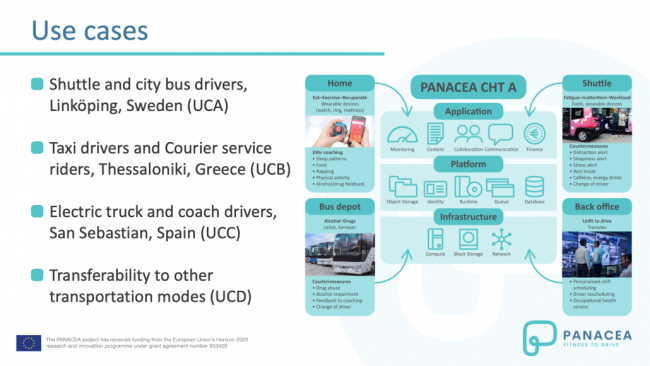PANACEA FINAL EVENT: A HOLISTIC APPROACH TO FITNESS TO DRIVE
The PANACEA project is coming to a close, and you are invited to the final event; an online webinar. Join the final event to discover the results of the project and the lessons learnt along the way. The event will be held online on 10 September 09:00-12:00.
During this webinar we will present details of how the integrated fitness to drive monitoring and assessment system was built, how the countermeasures were selected and designed and what the outcomes were from the pilot sites.
The project team will also look forward towards the impact of the project for example on future standards and the regulatory environment and of course share all our lessons learnt along the way.
This event will take place online using the Zoom platform. To register to attend please fill in the form here.
The draft agenda can be found here.
Welcome!
About Panacea:
How do you know you are fit to drive? How can we provide individual assessment and support, for example, professional drivers? This is what we shed some light on in SAFER's associated project PANACEA - Practical and Effective tools to monitor and assess commercial drivers' fitness to drive.
The project will design, develop and test a holistic driving ability assessment system for commercial drivers to be used pre-driving, during driving and at the roadside, paired with cloud-based countermeasure and coaching solutions. In order to achieve this, PANACEA will create driver-oriented, health-based, touchless, and use case driven health monitoring and assessment solutions capable of detecting for example alcohol, drugs, fatigue, stress and cognitive load. Those drivers detected as unfit by the assessment technology will receive personalised, targeted support from the cloud-based countermeasure and coaching system. Commercial Health Toolkits (CHTs), combining assessment techniques with countermeasure solutions, will be tailored to fit the specific needs of each use case. The CHTs aim to become an ecosystem of support and knowledge for drivers and operators alike, available before, after and during shifts as well as on site and roadside. The sensitivity, specificity, robustness, ease-of-use, satisfaction and acceptance of these CHTs will be evaluated with over 90 automated shuttle, e-truck, coach and taxi drivers and courier service riders, operators and stakeholders, across three pilots in Greece, Spain and Sweden, considering gender specificities. A fourth use case focuses on the transferability of the improved knowledge and technologies to other transport modes, i.e. aviation, maritime and rail.
Welcome to explore the website here!

